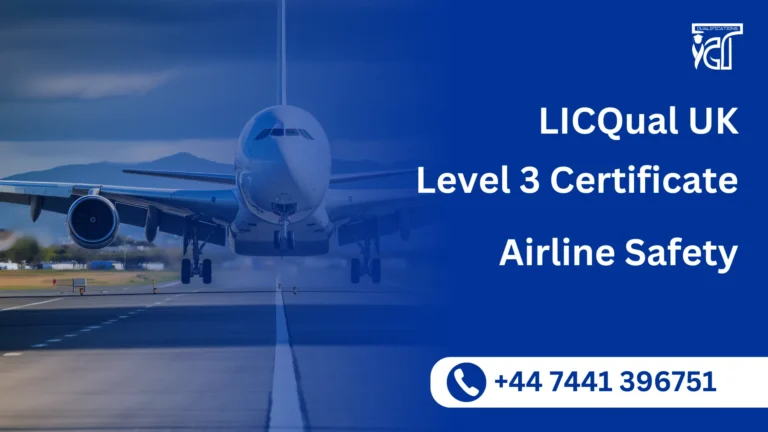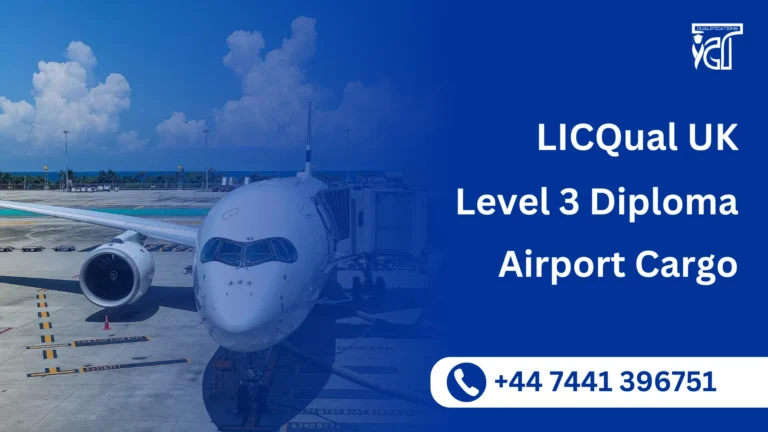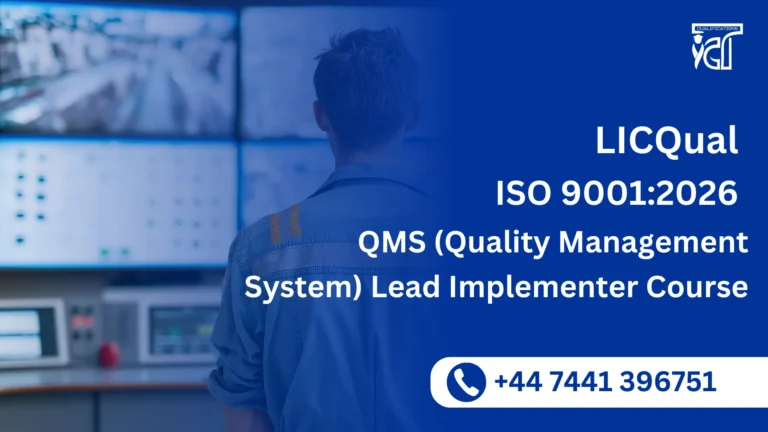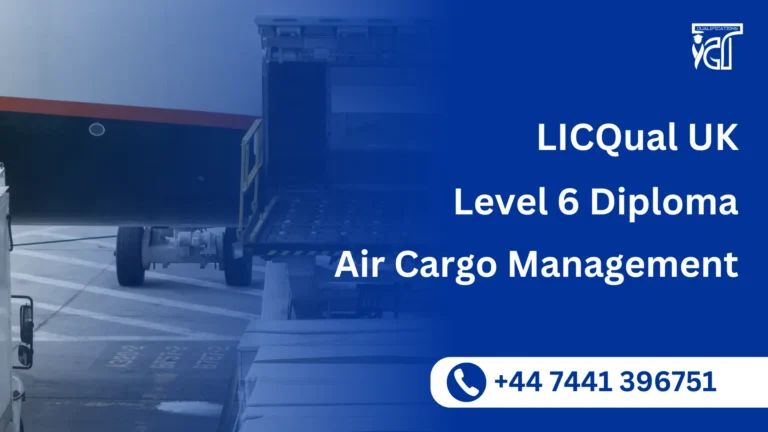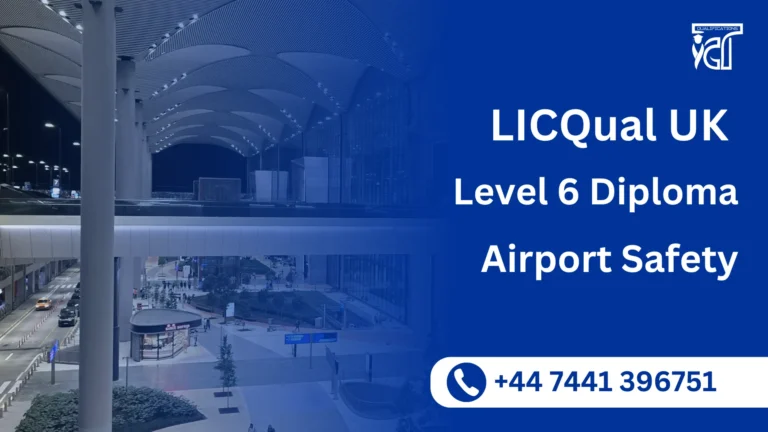In today’s fast-paced food industry, the importance of food safety management cannot be overstated. Ensuring food safety from farm to table is vital for the well-being of consumers, and businesses are under increasing pressure to comply with international food safety standards.
For professionals in food safety, the LICQual ISO 22000:2018 FSMS Lead Auditor course offers an essential qualification to master food safety management systems (FSMS) auditing. This Ofqual-regulated qualification, which is entirely assignment-based, provides a flexible and comprehensive path for individuals aiming to become experts in food safety audits and management systems.
The LICQual ISO 22000:2018 FSMS Lead Auditor course is designed for professionals who want to acquire the skills and knowledge necessary to audit food safety management systems in compliance with the ISO 22000:2018 standard. ISO 22000:2018 outlines the criteria for creating a food safety management system that ensures food safety across the entire supply chain, from farm to fork. By completing this course, professionals gain a thorough understanding of food safety principles, hazard analysis, and auditing techniques to effectively lead FSMS audits.
The LICQual ISO 22000:2018 FSMS Lead Auditor qualification is an essential credential for professionals in the food safety industry. With its Ofqual-regulated certification, assignment-based learning, and in-depth focus on food safety management systems, this course equips individuals with the knowledge and skills necessary to lead FSMS audits effectively.
Whether you’re looking to advance your career in food safety, improve organizational compliance, or become an expert in food safety management, this qualification offers valuable benefits that will set you apart in a competitive field.
LICQual ISO 22000:2018 FSMS Lead Auditor
Mandatory units
| Sr# | Unit Title | Credits | GLH |
|---|---|---|---|
| 1 | Introduction to ISO 22000:2018 FSMS and Food Safety Management Principles | 8 | 24 |
| 2 | Hazard Analysis and Critical Control Points (HACCP) Integration in FSMS | 8 | 24 |
| 3 | Planning, Conducting, and Reporting FSMS Audits | 6 | 18 |
| 4 | Leadership, Management Commitment, and Employee Participation in FSMS | 6 | 18 |
| 5 | Risk Assessment and Management in Food Safety | 6 | 18 |
| 6 | Continuous Improvement and Corrective Actions in FSMS | 6 | 18 |
GLH (Guided Learning Hours) and TQT (Total Qualification Time) are terms commonly used in vocational qualifications to help define the amount of time a learner is expected to spend on heir studies.
1. GLH (Guided Learning Hours)
GLH refers to the number of hours a learner spends being directly taught, supervised, or supported during their course. This includes the time spent in activities such as:
- Classroom instruction
- Practical workshops
- One-on-one tutoring or mentoring sessions
- Online learning sessions with tutor support
In other words, GLH represents the time that learners are actively engaged with their instructors or learning activities.
2. TQT (Total Qualification Time)
TQT represents the total amount of time a learner is expected to invest in completing a qualification, including:
- GLH (Guided Learning Hours): Time spent on direct learning, as explained above.
- Self-Directed Learning: This includes time spent on independent study, research, assignment completion, preparation for exams, and any other work the learner does outside of direct teaching hours.
TQT is a broader measure that includes all the time required to achieve the qualification. It helps learners and employers understand the overall commitment required for the qualification.
Key Differences Between GLH and TQT:
- GLH focuses on direct learning with guidance or supervision.
- TQT includes GLH as well as independent study time and other learning-related activities.
Example:
If a qualification has a TQT of 600 hours and a GLH of 250 hours, it means the learner should spend 250 hours in direct learning (classroom, online, or tutor-led sessions) and 350 hours on independent study or research.
Learning Outcomes of LICQual ISO 22000:2018 FSMS Lead Auditor
- Introduction to ISO 22000:2018 FSMS and Food Safety Management Principles
- Demonstrate a thorough understanding of the ISO 22000:2018 framework and the key principles of food safety management systems.
- Explain the requirements for an effective FSMS, including hazard analysis, risk assessment, and the importance of a food safety culture within organizations.
- Identify how ISO 22000:2018 can be implemented across various food sectors to ensure food safety and compliance.
- Hazard Analysis and Critical Control Points (HACCP) Integration in FSMS
- Apply the principles of Hazard Analysis and Critical Control Points (HACCP) to identify and control food safety hazards at every stage of the food production and supply chain.
- Integrate HACCP into an FSMS, ensuring that food safety risks are properly managed and controlled in compliance with ISO 22000:2018.
- Develop and implement control measures to mitigate potential food safety risks and ensure the production of safe food.
- Planning, Conducting, and Reporting FSMS Audits
- Plan and execute effective ISO 22000:2018 FSMS audits, demonstrating the ability to assess the implementation and effectiveness of food safety management systems.
- Collect and evaluate audit evidence, applying auditing techniques to identify gaps or non-conformities within the FSMS.
- Prepare and deliver clear, actionable audit reports that highlight strengths, weaknesses, and recommendations for food safety improvements.
- Leadership, Management Commitment, and Employee Participation in FSMS
- Recognize the importance of leadership and management commitment in establishing and maintaining a successful FSMS.
- Identify strategies to foster employee participation in the food safety process and develop a culture of food safety across all organizational levels.
- Demonstrate the role of leadership in ensuring continuous improvement and compliance with food safety standards.
- Risk Assessment and Management in Food Safety
- Conduct thorough risk assessments to identify, evaluate, and control food safety risks throughout the supply chain.
- Implement risk management practices in compliance with ISO 22000:2018, ensuring that hazards are systematically controlled and mitigated.
- Use risk management strategies to enhance the overall safety and quality of food products and minimize potential health hazards.
- Continuous Improvement and Corrective Actions in FSMS
- Apply the principles of continuous improvement to optimize the FSMS and ensure long-term compliance with ISO 22000:2018.
- Identify non-conformities, propose corrective actions, and follow up on improvements to maintain food safety standards.
- Monitor and measure the effectiveness of corrective actions and food safety practices, driving ongoing enhancements in the FSMS.
1. Ofqual-Regulated Qualification
The LICQual ISO 22000:2018 FSMS Lead Auditor certification is an Ofqual-regulated qualification, ensuring that it meets the highest standards of quality, rigor, and recognition. This regulation guarantees that the certification is widely respected in the UK and internationally. By obtaining this qualification, you enhance your professional credibility, making your expertise in food safety management systems auditing recognized by employers, regulators, and industry professionals around the world.
2. Flexible, Assignment-Based Learning
One of the standout features of this course is its assignment-based learning format. This means you can complete the course at your own pace, without the need for attendance at fixed classes. This flexibility makes it ideal for busy professionals who need to balance work commitments with their studies. You will be able to apply theoretical concepts directly to practical scenarios through assignments, allowing you to integrate learning with your daily responsibilities. This self-paced approach ensures a high level of convenience and accessibility for individuals with varying schedules.
3. Comprehensive Knowledge of ISO 22000:2018
This course provides an in-depth understanding of ISO 22000:2018, the international standard for food safety management systems. You will gain a thorough knowledge of the principles, requirements, and processes associated with FSMS, including how to conduct audits, manage non-conformities, and implement corrective actions. The course ensures that learners are well-prepared to help organizations comply with ISO 22000:2018 standards, contributing to better food safety practices and risk management throughout the food supply chain.
4. Improved Career Prospects and Opportunities
Upon successful completion of the course, you will possess valuable skills that are in high demand in the food safety and quality management sectors. The ISO 22000:2018 Lead Auditor qualification will significantly enhance your career prospects by positioning you as an expert in food safety management and auditing. It opens up numerous job opportunities, such as Food Safety Manager, Quality Assurance Specialist, Compliance Officer, or even consultancy roles in food safety audits. The qualification also provides a competitive edge for professionals seeking to advance in their current positions or transition into senior roles.
5. Hands-On Experience in Auditing
The LICQual ISO 22000:2018 FSMS Lead Auditor course focuses on practical skills that are essential for leading audits within an FSMS framework. Through assignments, learners develop a deep understanding of audit processes, including audit planning, execution, reporting, and follow-up actions. This hands-on experience equips you with the tools needed to perform effective food safety audits, identify non-conformities, and make recommendations for continuous improvement in food safety systems.
6. Global Recognition
ISO 22000:2018 is a globally recognized standard for food safety management, making the LICQual ISO 22000:2018 FSMS Lead Auditor qualification highly valued worldwide. By becoming certified in this internationally recognized standard, you are increasing your professional credibility and opening doors to opportunities in the global food industry. Whether you plan to work with local or international organizations, this certification ensures that your skills are applicable across borders, enhancing your employability.
7. Enhanced Food Safety Practices
With this qualification, you will gain the expertise to improve food safety management systems in your organization. The skills and knowledge you acquire will enable you to assess, evaluate, and enhance food safety procedures, ensuring that they meet both internal and regulatory standards. By conducting thorough audits, you will help organizations reduce risks, prevent contamination, and ensure that their products are safe for consumers. This will ultimately contribute to higher food safety standards, improved public health, and greater consumer confidence.
8. Networking Opportunities
Completing this course provides you with access to a network of professionals working in the food safety and quality management industries. You will have the opportunity to engage with like-minded individuals, share experiences, and learn from others in the field. Networking with peers in the industry can lead to valuable professional connections, new insights, and potential career opportunities. The course also helps you stay informed about industry trends and best practices.
9. Cost-Effective Learning Solution
The assignment-based format and self-paced structure of this course make it a cost-effective learning solution. Without the need for travel or physical attendance in a classroom, the course offers savings in terms of time and money. This flexibility allows professionals to manage their learning around their current work commitments, making it a more accessible and affordable option compared to traditional classroom-based courses.
The LICQual ISO 22000:2018 FSMS Lead Auditor course provides numerous benefits, including an Ofqual-regulated qualification, flexible learning, and enhanced career prospects. By gaining in-depth knowledge of ISO 22000:2018 and developing practical auditing skills, professionals can make a significant impact in improving food safety management systems and ensuring compliance with international standards. Whether you’re looking to advance in your career, expand your knowledge, or gain a globally recognized qualification, this course offers a pathway to success in the food safety and quality management sectors.
1. Professional Background
The ideal learner for the LICQual ISO 22000:2018 FSMS Lead Auditor course is a professional with experience in food safety, quality management, or auditing within the food industry. This includes individuals who hold roles such as Food Safety Managers, Quality Assurance (QA) Managers, Compliance Officers, Internal Auditors, Risk Managers, or Production Managers in food manufacturing, distribution, or retail. Professionals who are responsible for ensuring that their organization adheres to food safety standards and regulatory compliance will benefit greatly from this course.
Additionally, those involved in the implementation and management of Food Safety Management Systems (FSMS) or working in the food supply chain will find the course highly relevant. Professionals aiming to transition into auditing roles or those seeking to formalize their existing food safety knowledge will find this course a perfect fit.
2. Educational Qualifications
While there are no strict academic requirements for enrolling in the LICQual ISO 22000:2018 FSMS Lead Auditor course, the ideal learner often has a background in Food Science, Food Engineering, Quality Assurance, Risk Management, or Environmental Health. These foundational areas help learners better understand the complexities of food safety management systems.
Professionals with a higher-level qualification, such as a Bachelor’s degree in a related field, will find it easier to grasp the more technical aspects of ISO 22000:2018 and the auditing process. However, professionals without a formal degree but with sufficient work experience in food safety or quality management can still succeed in the course and apply the knowledge gained to their professional roles.
3. Experience and Competency
The ideal learner typically has 2-3 years of experience working in the food industry, particularly in roles related to food safety or quality management. Experience in auditing or conducting internal assessments of FSMS, or even risk management practices, provides a solid foundation for this course.
Even if learners do not have formal auditing experience, they should be familiar with basic food safety regulations and the hazards associated with food production and handling. Experience with any international or national food safety standards (e.g., ISO 22000, HACCP, or GMP) will help learners quickly understand and apply the principles and processes involved in ISO 22000:2018.
4. Learning Motivation and Career Aspirations
The ideal learner is motivated by the desire to advance their career in food safety and quality management. This course is suitable for professionals who are keen to take on lead auditing roles in their organization or pursue positions in consultancy. These individuals aspire to enhance their auditing skills and become experts in FSMS auditing, making them valuable assets to their organizations or clients.
Additionally, professionals interested in gaining a globally recognized qualification to work internationally or those seeking to increase their credibility within their industry will find this course beneficial. Learners should be driven to stay current with evolving food safety standards and contribute to creating safer food systems.
5. Skills and Attributes
The ideal learner should possess strong analytical and problem-solving skills, as auditing involves assessing complex systems and identifying areas for improvement. Attention to detail is critical in identifying potential food safety risks and hazards.
Excellent communication skills are essential for writing clear, concise audit reports and delivering findings to senior management or stakeholders. Additionally, the ability to work independently and manage one’s time effectively is important, especially since this course is entirely assignment-based.
Learners should also have a solid understanding of food safety regulations and best practices, as well as a strong desire to improve food safety in their workplace. Those with a proactive mindset and a willingness to learn will thrive in this course and be able to apply the concepts learned directly to their role.
6. Technological and Language Proficiency
Given the increasing role of digital tools in auditing and reporting, the ideal learner should be comfortable using technology to complete assignments, research, and manage documentation. This includes proficiency with basic Microsoft Office applications (Word, Excel, PowerPoint) or other auditing software.
Since the course is conducted in English, the learner should have a strong command of the language, especially in reading, writing, and understanding complex audit reports, regulations, and ISO standards.
7. Commitment to Ongoing Professional Development
The ideal learner is someone who is committed to ongoing professional development and understands the importance of staying current with industry standards and food safety practices. As food safety regulations and practices evolve, the ideal learner will take pride in continually improving their knowledge and skills, both through formal training and practical experience.
The ideal learner for the LICQual ISO 22000:2018 FSMS Lead Auditor course is an experienced professional in the food safety or quality management field, with a desire to specialize in auditing food safety management systems. With a solid background in food safety, risk management, or quality assurance, and a passion for career development, this learner will gain valuable skills to help organizations maintain high standards of food safety.
By completing this course, learners will become proficient in ISO 22000:2018, capable of leading audits, and empowered to make meaningful contributions to improving food safety practices across the food supply chain.
Entry Requirements
To enrol in the LICQual ISO 22000:2018 FSMS Lead Auditor candidates must meet the following entry requirements:
Register Now
Qualification Process
Qualification Process LICQual ISO 22000:2018 FSMS Lead Auditor
- Self-Assessment:
Begin by evaluating your eligibility to ensure you meet the qualification requirements, including work experience, knowledge, and language proficiency. - Registration:
Complete your registration by submitting the required documents, including a scanned copy of a valid ID, and paying the registration fee. - Induction:
An assessor will conduct an induction to confirm your eligibility for the course and explain the evidence requirements. If you do not meet the criteria, your registration will be canceled, and the fee will be refunded. - Assignments & Evidence Submission:
Provide all assignments and the necessary evidence based on the assessment criteria outlined in the course. If you are unsure of the required evidence, consult with the assessor for guidance on the type and nature of evidence needed. - Feedback and Revision:
The assessor will review your submitted evidence and provide feedback. Evidence that meets the criteria will be marked as “Criteria Met,” while any gaps will be identified. You will be asked to revise and resubmit if needed. - Competence Evidence:
Submit final evidence demonstrating that all learning outcomes have been met. This evidence will be marked as “Criteria Met” by the assessor once it is satisfactory. - Internal Quality Assurance (IQA):
The Internal Quality Assurance Verifier (IQA) will review your evidence to ensure consistency, quality, and compliance with standards. - External Verification:
The IQA will submit your portfolio to LICQual UK Ltd External Quality Assurance Versifier (EQA) for final confirmation. The EQA may contact you directly to verify the authenticity of your evidence. - Certification:
Upon successful completion of all checks, LICQual UK Ltd will issue your official certificate, confirming that you have attained the LICQual ISO 22000:2018 FSMS Lead Auditor


